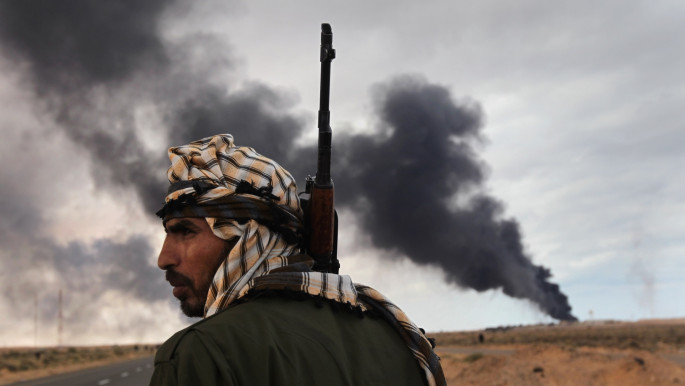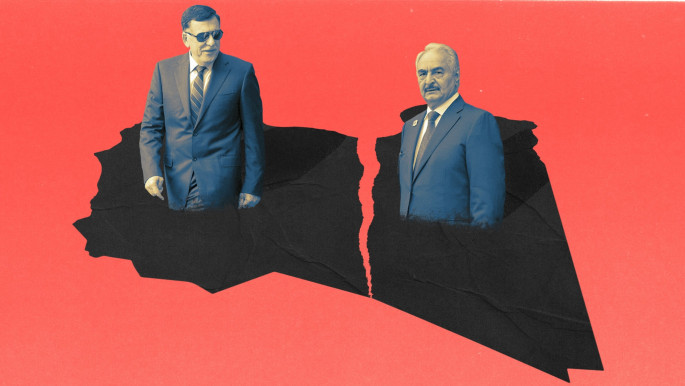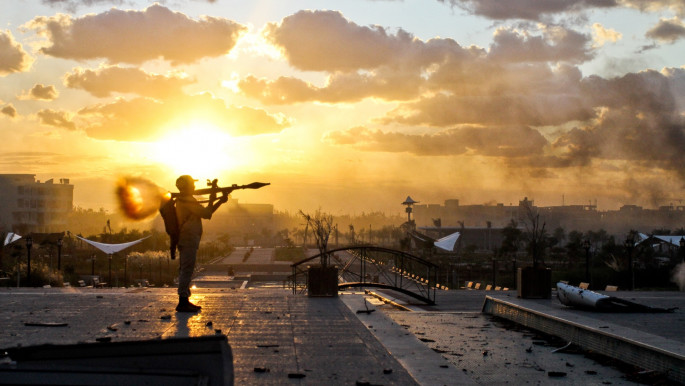What does the future hold for Haftar and the Libyan National Army?
On 24 December, Haftar threatened to attack Turkish troops in Libya. Turkish troops are in Libya to support the UN-recognised Government of National Accord (GNA) based in Tripoli. Haftar has had varying degrees of foreign support from the United Arab Emirates (UAE), Russia, France, and Egypt.
Turkish Defence Minister Hulusi Akar responded to the LNA leader's threats by warning that: "This war criminal, thug Haftar and his backers should know that in the event of any attempt to attack Turkish forces, the killer Haftar's forces will be viewed as legitimate targets everywhere."
Haftar's LNA launched an offensive in April 2019 to capture Tripoli, besieging the city for months until the Turkish-backed GNA managed to push it back. The GNA has since reconsolidated its control over Libya's west while the LNA retains its hold over the east with the front lines between the two adversaries remaining static since June.
On 23 October, both sides agreed to a ceasefire that was hailed by the United Nations, although tensions and mistrust, to put it mildly, remain. The GNA's defence minister said on 11 December that Haftar was violating the ceasefire by launching attacks in the south of the country and warned that the GNA would not stand for such violations. He also ruled out the prospect of including Haftar in any political agreement.
 |
Time is not on Haftar's side. Cairo and Moscow wish to turn him into someone who is less and less indispensable over the months |  |
On 27 December, a high-level Egyptian delegation visited Tripoli, the first since 2014. Egypt backs the LNA and opposes Turkey's military presence in Libya, although this visit indicates it wants to resolve the conflict through a negotiated settlement rather than through force of arms. These developments could have major implications for the future of Haftar and the LNA.
"Haftar's remarks on 24 December were a way for him to indicate to the world that the ceasefire no longer exists," Jalel Harchaoui, Senior Fellow at the Global Initiative, a Swiss-based institute, told The New Arab. "He essentially said that he doesn't feel at all committed to complying with any of the clauses or stipulations Haftar's representatives signed off on back in late October. In all fairness to Haftar, the 23 October ceasefire was never respected by either camp."
 |
|
| Read more: Divided Europe: How the West lost influence in Libya's war |
Harchaoui views the visit by the Egyptian delegation as an "important and historic gesture" although does not see it as a shift in Cairo's stance since, over the past 2-3 years, Egypt has never encouraged Haftar's "adventurism." The Egyptian leadership stayed silent "out of deference for UAE Crown Prince Mohammed bin Zayed" even though they disliked Haftar's behaviour.
"For instance, before Haftar's assault began on 4 April, 2019, the Egyptians were of the opinion that the Libyan National Army would likely fail," Harchaoui said. "Both Cairo (and Moscow) considered that Haftar lacked the dependability, military might, and socio-political anchoring necessary to succeed in such an outsized undertaking 600 miles from his bases."
This shared scepticism brought Egypt and Russia closer together but did not stop Haftar from taking that fateful decision in April 2019 since his "top booster is Abu Dhabi always." Fast forward to the present and Egypt's main goal in Libya is bringing about stability rather than advocating for Haftar. Cairo also doesn't want any more war.
Harchaoui identified two key reasons for this. Firstly, a resumption of the fighting could result in the GNA seizing more territory, such as Sirte and the Oil Crescent, which would put it closer to Egypt's border. Secondly, it could force Egypt to intervene overtly in Libya, which it doesn't want given the numerous problems it has on the home front.
 |
The UAE will not abandon its attempts to make Turkey's presence in Libya costly, painful and unsustainable |  |
"So, all in all, the delegation is not so much a change in shift," Harchaoui said. "Rather, it is a way for Egypt to make its stance more explicit. It is showing it can talk to Tripoli and accept the current reality."
On 9 December, Egyptian President Abdel Fattah el-Sisi stressed that his country "will never initiate an attack" in Libya and that it is working toward "a comprehensive political solution, which remains the only possible path to settle the Libyan crisis and to bring about stability to this brotherly country that shares with Egypt an 1,200-kilometre-long border."
"If Egypt revives diplomacy and resumes business in northwestern Libya and continues to increase its influence slowly in northeast Libya, Cairo will be happy," Harchaoui said. Also, Egypt doesn't want to see the Turkish-backed GNA launching any major offensives into Sirte and the Oil Crescent which "explains part of the thaw with Ankara and Tripoli."
"Despite all of the above, Cairo cannot single-handedly prevent war," he added. "There are other forces at play." Those other forces most notably include the UAE, which, unlike Egypt and Russia, "cannot and does not accept the current reality in northwestern Libya."
 |
|
| Read more: Is Libya on the road to de facto partition? |
"Over the long haul, Abu Dhabi remains committed to eradicating any mode of governance that may tolerate the Muslim Brotherhood or a similar semi-democratic, populist current as a legitimate political strand in Tripoli," Harchaoui said. "An irrevocable corollary from these threat perceptions is that the UAE will not ever abandon its attempts to make Turkey's presence in Libya costly, painful and unsustainable. It just won't stop trying."
The UAE maintains access to airbases in western Egypt near the Libyan border, where it is known to have deployed some of its Mirage 2000 fighter jets in the past as well as armed Chinese-built Wing Loong drones. The latter carried out several strikes in support of the LNA throughout the conflict.
"Egypt - while it pursues its conversation with Tripoli and Ankara - cannot truly oppose the UAE," Harchaoui said. "In fact, Egypt may still be sucked into the next phase of the war some way or other. This scenario shouldn't be ruled out."
He doubts Abu Dhabi will ever "genuinely contemplate" any form of compromise in Libya and will continue looking for ways "to prevent any equilibrium that could prove manageable and worthwhile from the point of view of Turkey in general."
 |
Haftar could well reignite the conflict, even if he has no chance of winning, since continued peace could result in him losing all of his political relevance |  |
Even taking the UAE out of the equation, pressuring Haftar isn't really a viable option for Cairo since the LNA "continues to be the only security architecture in the eastern part of Libya."
"In other words, Haftar, his sons, and their most loyal brigades, are still indispensable and impossible-to-circumvent in some key areas of northeast and southwest Libya," Harchaoui said.
And while there is a civilian parliament in the Libyan city of Tobruk it remains "way too frail to act as an alternative centre of power" since it is "profoundly divided and House Speaker Aguila Saleh is being challenged quite crudely from different directions."
 |
|
| Read more: France and Turkey's growing rivalry in the Middle East |
"Because of that, Aguila Saleh and Khalifa Haftar are close to each other once again, after months of relative divergence," Harchaoui said. "As things stand now, there's no real effort by anyone to confront or hurt Haftar frontally."
Consequently, Cairo and Moscow seek to gradually make incremental progress on lessening dependency on Haftar over time. "Time is not on Haftar's side," Harchaoui said. "Cairo and Moscow wish to turn him into someone who is less and less indispensable over the months."
However, the UAE continues to strongly support him which could well result in him launching further attacks against GNA interests. Haftar could well reignite the conflict, even if he has no chance of winning it, since continued peace could result in him losing all of his political relevance and deny him from having a role in Libya's future.
"As a result, he will try and attack the GNA – even if he's almost certain to be punished in a very dangerous fashion by Tripoli and Ankara," Harchaoui said. "He just has no choice. At least, war offers him a tiny chance of political survival, unlike peace, which can only crush his career for sure."
Follow him on Twitter: @pauliddon







 Follow the Middle East's top stories in English at The New Arab on Google News
Follow the Middle East's top stories in English at The New Arab on Google News


